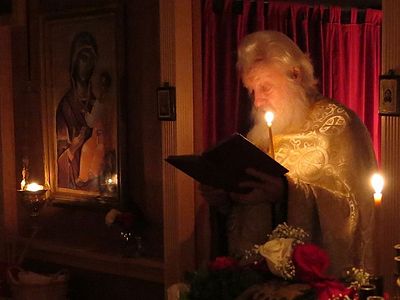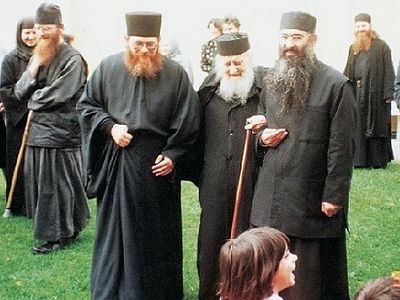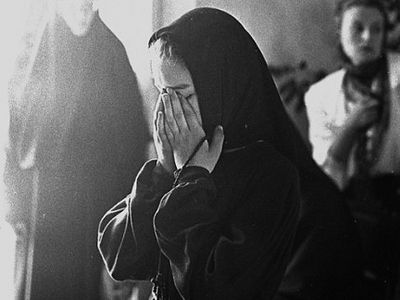Many people send letters to Pravoslavie.ru addressed to Professor Alexei Iliych Osipov. After choosing those more frequently asked, these question were posed to Prof. Osipov—on doubts about the faith, about how to discern God’s will, how to give alms, why the Orthodox are patient in deprivations, and whether there is justice on this earth.
Giving charity
What more can be said about this other than what Christ Himself said? Do not sound a trumpet before thee (Matt. 6:2). There was a custom that the Pharisees especially loved to follow: to stand on the crossroads and sound a trumpet, to give a signal that the needy should run to them, then triumphantly hand each one some small coin—as if they were handing out rewards. Do you recall how Christ valued the widow’s mite? She gave less than everyone, but He considered her sacrifice to be the greatest. And the essence of almsgiving, as it turns out, consists not in how much we give, and not in—and this is very important!—people seeing your sacrifice. Absolutely not. But the essence of almsgiving is in the proper state of the soul, without which almsgiving is not pleasing to God.
And what is this state of soul? Giving alms only for the sake of fulfilling the commandment to love your neighbor—and only for the sake of that!
St. Nikon of Montenegro, a ninth century Serbian saint, had an astonishing thought when he wrote, “It is better to give your property to the poor than to donate it church for adornments.” How about that—it’s better to give your money to the poor than to adorn a church! We sometimes see people boasting that they “worked for the church!” This is the external view. It only seems to them that they’ve done something special. It even gets to the point where they hang a plaque in the church stating who paid for the church’s construction or adornment. What are we doing?! The Lord says, But when you give to the needy, do not let your left hand know what your right hand is doing (Matt. 6:3).
Every true virtue is deeply chaste. And this is a very important patristic condition. Not riotous, when we’re ready to reveal everything we have, but chaste, which always conceals itself and never intrudes.
Note: When Christ resurrected the twelve-year-old girl, Jairus’s daughter, He bade her parents never to tell anyone about it (cf. Mk. 5:38-43; Lk. 8:51-56).
This is the natural quality of any virtue—chasteness. And the very essence of charity is in this. And the more chaste the charity, the more it heals our souls. This also works the other way around.
Is there justice on earth?
My grandmother (who died in 1931) said, “Truth is sitting over there in the corner, well fed and not thirsty, but no one even wants to look at it.” Igumen Nikon (Vorubiev’s) grandmother used to put it this way: “Truth is on the bottom of the sea, and it even has an anchor”—so that it would never float up to the surface and no one would suddenly see it. St. Ignatius (Brianchaninov) writes that the truth of this world is as a rule not God’s truth at all, because worldly truth is usually darkened by very many human calculations, by cunning and hypocrisy; and often also with deception and sham.
There is an excellent thought on this theme: It is a matter of righteousness to demand justice; but it is a matter of love to sacrifice it. This is a Christian principle: There is no truth, no kindness, and no goodness where there is no love.
Charity can be given without any love whatsoever—we have seen this, for example, in the West. How is charity usually given there? So that others would see them do it? No, not at all. A check is written for such and such an amount to such and such a place. But it is so important to have personal contact with the person you’re helping! It means so much to visit a sick or old person and help him. This produces an entirely different moral and psychological impression on the soul compared to simply putting money in the granny’s bank account. Here, as we see, is real charity, and not simply giving someone money.
I will repeat once again the main condition for the Christian faith: There is no goodness where there is no love. This includes charity—there is no charity where there is no love. And no one can justify himself with any sort of justice where there is no love.
A. S. Khomyakov said some very interesting words, which could serve as an expression of what many people are now saying, asking, inquiring, delving into—about the “Russian idea”. What is the “Russian idea? Khomyakov did not answer this question, but he did address the essence of it: “Unity in freedom according to the law of love.” We are not just talking about a law, as if to say, “Look how merciful we are—we give people rights,” and so on. No, no rights can be good or benefit a person if there is no love in them. Of course, freedom itself is a great benefit. But without love it becomes its opposite. Do you need proof? See “Charlie Hebdo.” They laughed at Mohamed, and they got their returns.
What should we do when doubts arise in our faith?
First of all, we have to remember that doubt—if it not just speculation or discourse but precisely doubt that we can see undermines faith in us as such—is a sin just as guile, deception, or theft are sins, for example. It is a sin. Therefore it is one thing to truly analyze some questions that in this case are not understandable to us, and quite another thing when these doubts progress to the point of nearly rejecting the Faith. This is a very important provision.
Secondly: We have to remember a very significant spiritual law, perhaps even the primary law of man’s spiritual life: Spirit (that is, a spiritual state) creates forms for itself. So, my spiritual state determines the entire direction of my life’s activity—both worldview (philosophies, analyses, doubts, assertions), and all practical life.
A person’s spiritual state determines the whole character of his life—this is a very important law, which, unfortunately, remains outside many people’s field of vision, including even that of us Christians. Therefore we need to be concerned about our correct spiritual state. The more correct it will be, the less there will be the doubts and the more easily, incidentally, these doubts, which naturally arise in our souls, will be resolved.
Thirdly, I would like to direct your attention to this: We should never, ever worry when doubts come. I’ve also had doubts. And where are they now? You too will find the answer to your doubt—you’ll read it or someone will suggest it to you. Everything comes in good time.
It is not surprising that someone has doubts; O, if only that were all! But what comes up beside doubts? Things that are not fit to mention, and you’ll never in your life mention them. As the hero of Dostoevsky’s novel, Humiliated and Insulted, the general, said: “O, if what is going on in my soul were only revealed, I think that the whole world would have to gasp!” So, we shouldn’t be surprised even at this. A lot of things come up in our souls.
And how do I, for example, relate to all the bad things that come up in my soul? I understand that it is bad, and I try to struggle with it. We have to struggle. How we struggle is another question. But the essence is just this: Do not be surprised. We are sick people—and we have to firmly keep this in mind. This is why were born here, in this hospital. And this sickliness of ours manifests itself in the most diverse forms, one of which is doubt.
How can we learn to recognize God’s will?
How can I learn God’s will? That is, how can I penetrate into the mind of God, into what God is thinking? This is horrible! It is impermissible to even phrase the question like this! The question should be: How can I fulfill God’s will? How can I keep from being an opponent of God’s will in my life or in one or another move? There is an answer to this question, and everyone knows it: To the extent of your foolish (and I emphasize, foolish) mind, O man; to the extent of your seared (and I emphasize, seared) conscious, you should act according to that mind, but sincerely; and according to that conscience, but sincerely. Act sincerely—this will be your fulfillment of God’s will. Because God wants only one thing from us: that we act reasonably and according to our conscience. That we act reasonably, for God gave us light and reason. He did not call us to madness, but to reasonableness. The holy fathers said just that: “There is no virtue and goodness without discernment”—that is, without mind.
Thus, when I act according to reason and sincerely (sincerely!—not craftily, not justifying myself, as if saying, “Lord, I see that I am acting rightly and honestly after all), then I am acting according to God’s will—even if I am making a total mistake. And if I do something mistakenly but sincerely, then as all the fathers of the Church confirm, the Lord will see my desire to act according to His will and correct my mistake.
Why is Russia experiencing deprivation these days?
For a very simple reason: Russia is still alive.
Once I was strolling around Vienna with an acquaintance. It was summertime, and just beautiful everywhere. The lady said to me, “How wonderful! But how bad and disorganized it is in Russia! Moscow is so dirty! Why?” I replied to her exclamations with another question: “What do you think—who do they treat, and who do they beautify?” She looked at me with perplexity. I explained, “They treat the sick and beautify the corpse. Vienna is a beautiful city. But look: I get the impression that people need nothing else here—it’s paradise on earth. One starts to think, ‘you can have your heaven and your God. I’m am fine where I am’.” It’s a rather dangerous thing for a person to live in total earthly comfort.
One ascetic prayed tearfully to God, “O Lord, why don’t I have any sorrows? How have I angered Thee?” That’s how he looked at it.
All our difficulties and problems are a sign that our people have not yet died. Sick people are treated. The treatments can be different—there are sweet medicines and bitter medicines. There are also surgical operations. But this is treatment, cure. So, all our deprivations testify to the fact that we are alive.
For without sorrows, without difficulties it is impossible for a person to detach himself from this earth, which he will have to leave anyway, whether he wants to or not.
I will relate to you one telling incident that happened in Geneva. I was told it by our representative at the World Council of Churches (there are about 300 different churches in it: Protestant, and almost all the Orthodox Churches with the exception of the Bulgarian and Georgian Churches). The General Secretary of the WCC—the number one figure in this ecumenical organization—dies. In the cathedral church in Geneva, a large and very pretty Calvinistic church, a wake is scheduled. A portrait of the deceased was placed in the church, and people were gathered from all over the world. A “farewell” takes place before the portrait. Meanwhile a hearse containing the coffin of the General Secretary very quietly enters the square and parks at the furthest corner. The wake ends and all disperse. Only a few close relatives of the deceased, trying not to attract any attention, go to the far corner of the square where the coffin is in the hearse, get in the car, and drive to the cemetery. No one sees the deceased. And there’s no need to see him! Why remember death? We are going to live here forever, don’t you know that?! It’s beautiful here!
Have you ever noticed what they show on television? Fun, festivals, dancing, games, competitions… Do they ever show hospitals? Do they show how many people suffer? And how they suffer! Once we went to visit a bed-ridden woman in an old age home. The orderly said, “You don’t want to feed her, do you? Don’t do that! If you do, then clean up after her…”
So much suffering! And how do we live? Oh, if only we saw this suffering, we might change our view of life, our relationship to other people.
We should after all understand that our earthly life is not a resort but a hospital. Its task is not at all to give us fantastic pleasures, but so that here, on earth, we would at least slightly understand our sickness and turn to God. For, as the apostle Paul writes, For here have we no continuing city, but we seek one to come (Heb. 13:14).
This is why there are hardships in Russia. And there always will be hardships, as long as we are even a little bit alive.







